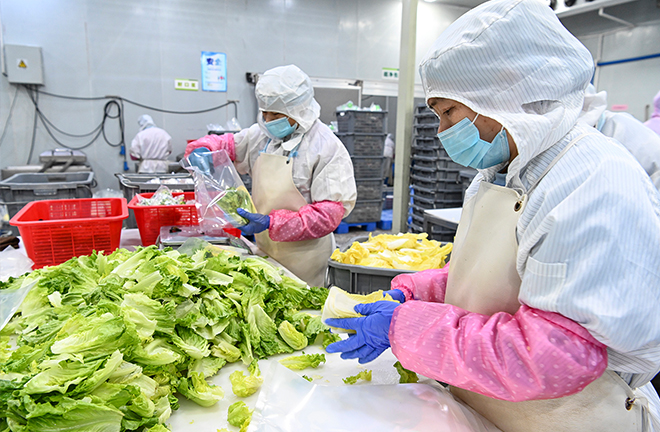Proposals and suggestions at Two Sessions well-implemented

Staff at a company in Guangzhou, Guangdong Province, pack vegetables headed for Hong Kong. Photo:Chen Jimin/CNS/CFP
This year’s Two Sessions has just concluded. The “two sessions,” the annual session of the National People’s Congress (NPC), and the annual session of the Chinese People’s Political Consultative Conference (CPPCC) National Committee, are crucial in China’s political calendar.
According to statistics, the majority of the proposals and suggestions advanced by NPC deputies and CPPCC members in 2021 have been implemented.
The 8,993 proposals put forward by NPC deputies during the Fourth Session of the 13th NPC in 2021 were handed over to 194 implementing units for study and handling; 248 suggestions put forward by NPC deputies during the intersessional period have been assigned to 91 relevant units for study and handling. This year’s Fifth Session of the 13th National Committee of the CPPCC reported on work concerning the proposals since its fourth session. Among the 6,117 proposals made by CPPCC members and the CPPCC’s participating units, 5,039 proposals were filed, and 99.8% of them have already been handled and responded to.
Rural vitalization
CPPCC Member He Yun’ao, director of the Institute of Natural and Cultural Heritage Research at Nanjing University, submitted 26 proposals in 2021, covering such fields as archaeology, cultural heritage, cultural construction, and rural vitalization. In his proposal on further leveraging cultural heritage relating to agriculture, rural areas, and rural people to promote rural vitalization, he wrote: “much has yet to improve in the protection, inheritance, development, and utilization of cultural heritage relating to agriculture, rural areas, and rural people. It is urgent for relevant departments to prioritize and incorporate this into the practice of rural vitalization in the new era.” As such, he recommended to “carry out a census of cultural heritage relating to agriculture, rural areas, and rural people, establish a database, break the division of labor between departments, and coordinate to solve the protection, utilization, and development of such cultural heritage.”
As the implementer of this proposal, the National Rural Revitalization Administration has consulted with the Ministry of Culture and Tourism, the National Development and Reform Commission, the Ministry of Education, the Ministry of Finance, and the Ministry of Housing and Urban-Rural Development. A clear answer has been given to the work results of the census of agricultural and rural cultural heritage carried out in a wide range of locations in recent years, and the coordinated protection, utilization, and development of such cultural heritage.
In addition, next steps have been mapped out.
“Fully leveraging the unique role of cultural heritage relating to agriculture, rural areas, and rural people in rural vitalization, coordinating and strengthening the protection of rural and agricultural cultural heritage sites” … “Through launching master’s studios and training centers, inheriting and developing rural traditional cultural skills, thus providing industrial and talent support for rural vitalization.” The document produced in reply clarified the implementation measures.
He Yun’ao’s above-mentioned proposals received timely responses, which is a vivid epitome of the efficient handling of tens of thousands of suggestions and proposals submitted by thousands of NPC deputies and CPPCC members every year.
Greater Bay Area construction
NPC Deputy Li Qingquan, secretary of the Party Committee of Shenzhen University, has continued to encourage the construction of the Guangdong-Hong Kong-Macao Greater Bay Area in recent years. Li’s two proposals at the Two Sessions in 2021 focused on facilitating the coordinated development of higher education in the Greater Bay Area. As early as 2018, he submitted seven suggestions centered around this. These suggestions focus on increasing support for local higher education institutions, creating Shenzhen’s higher education special pilot zone, expanding Shenzhen’s higher education institutions’ autonomy in running schools, and promoting the two-way complementary cooperation of higher education between the Chinese mainland and Hong Kong.
Regarding these proposals, the Ministry of Education spoke with the Ministry of Finance and the National Development and Reform Commission and gave a clear response to Li’s suggested establishment of a joint university in the Greater Bay Area to promote the coordinated development of higher education in Guangdong, Hong Kong, and Macao.
CPPCC Member Xu Ling, vice president of Guangdong Polytechnic Normal University, has been working in the front line of vocational education for many years. Over the past five years serving as a CPPCC member, she has submitted 16 proposals on the training of vocational and technical talent. At the Two Sessions last year, she proposed to establish a vocational education reform pilot zone in the Greater Bay Area. Replying to this suggestion, the Ministry of Education stated that it will actively promote educational exchanges and cooperation among higher education institutions in the Chinese mainland, Hong Kong, and Macao, expand communication and cooperation platforms, and jointly study and expand the depth and breadth of vocational education cooperation in the Greater Bay Area with relevant departments.
Looking to the future, the interviewed NPC deputies and CPPCC members said that they will always keep in mind the people’s interests and fulfill their duties.
Edited by JIANG HONG
